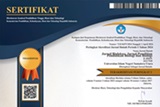Production of tempe koro benguk using local starter and its implementation as a biotechnology module for high school students
Abstract
The Kurikulum Merdeka emphasizes integrating local wisdom into education to develop students’ soft skills and character. Traditional foods like koro benguk tempe (TKB), a fermented product made from Mucuna pruriens (L.) DC. from Dimoro Village, Central Java, offer an excellent avenue for such integration in biotechnology education. A survey at Yadika 4 High School revealed a lack of local wisdom-based practical guides, demanding the need for resources that could enhance student engagement in biotechnology knowledge. This study developed practical guidelines for TKB production, focusing on its organoleptic properties, integration feasibility, and feedback from teachers and students. Laboratory experiments and module development were combined to collect data. Organoleptic tests identified 0.3% starter concentration as optimal, producing tempe with a white color, soft texture, and pleasant taste. The practical guidelines achieved a validation score of 89% from language, material, and media experts, while teachers rated them at 90%, and students responded positively with a 73% score. Further research is needed to refine the fermentation process of TKB beyond 36 hours and analyze its pH content. Expanding the study to include other fermented local products could further enhance biotechnology learning. Integrating local wisdom through practical guides not only promotes cultural preservation but also improves students' memory, manipulative skills, creativity, communication, and responsibility.
Keywords
Full Text:
PDFReferences
Abdulhalim, B. A., & Mohammad, M. A. (2023). Reducing Antinutritional Hydrogen Cyanide, Phytic Acid, and Trypsin Inhibitor in Rambling Vetch, Culban (Vicia peregrina). In IOP Conference Series: Earth and Environmental Science, 1158(5), 052003.
Adinugraha, F. (2018). Tari Dolalak Sebagai Bentuk Pendekatan Kearifan Lokal Dan Budaya (Kalbu) Pada Mata Pelajaran Biologi. EDUKA : Jurnal Pendidikan, Hukum, Dan Bisnis, 3(1), 19-32.
Asiimwe, R., Katungi, E., Marimo, P., Mukankusi, C., Rubyogo, J.C., & Anthony, V. (2024). Evaluating consumer preferences for reduced cooking time, taste and colour of beans in rural and urban communities in Uganda. Agriculture & Food Security, 13(19), 1-30.
Azahra, F.R., Afrinaldi, R., & Fahrudin. (2021). Keterlaksanaan Pembelajaran Bola Voli Secara Daring Pada SMA Kelas X Se- Kecamatan Majalaya. Jurnal Ilmiah Wahana Pendidikan, 7(4), 531-538.
Bintanah, S., Hagnyonowati, & Jauharany, F.F. (2021). Analysis of nutrition and preferences of beneng taro (Xanthosoma undipes Koch) flour as a functional food to reduce blood sugar levels. Prosiding Seminar Nasional Unimus, 4, 1689- 1697.
Bintari, S.H., & Parman, S. (2019). Antioxidant capacity and nutritional value of tempe yogurt. Journal of Physics: Conference Serie, 1321, (3), e032048.
Budiarti, W., & Oka, A.A. (2017). Pengembangan Petunjuk Praktikum Biologi Berbasis Pendekatan Ilmiah (Scientific Approach) Untuk Siswa Sma Kelas Xi Semester Genap Tahun Pelajaran 2013/2014. BIOEDUKASI (Jurnal Pendidikan Biologi), 5(2), 123-130.
Castaneda, F.L.A., Auer, J., Leong, S.L., Newson, W.R., Passoth, V., Langton, M., & Zamaratskaia, G. (2024). Optimizing Soaking and Boiling Time in the Development of Tempeh-like Products from Faba Bean (Vicia faba L.). Fermentation, 10(407), 1-13.
Ciabotti, S., Barcelos, M.F.P., Pinheiro, A.C.M., Clemente, P.R., & Lima, M.A.C. (2007). Características sensoriais efísicas de extratos e tofus de soja comum processada termicamente e livre de lipoxigenase. Ciência e Tecnologia de Alimentos, 27, 643–648.
Elhalis, H., Chin, X.H., & Chow, Y. (2024). Soybean fermentation: Microbial ecology and starter culture technology. Critical Reviews in Food Science and Nutrition, 64(21), 7648-7670.
Ernaliza. (2018). Pengembangan Panduan Praktikum Asam Basa Dengan Mengintegrasikan Kearifan Lokal di SMA Negeri 2 Sigli. Universitas Islam Negeri Ar-Raniry, Banda Aceh.
Festiyed, F., Mikhayla, M.E., Diliarosta, S., & Anggana, P. (2022). Pemahaman Guru Biologi SMA di Sekolah Penggerak DKI Jakarta terhadap Pendekatan Etnosains pada Kurikulum Merdeka. Jurnal Pendidikan Dan Kebudayaan, 7(2), 152–163.
Ghosh, B., & Ray R.R. (2011). Current commercial perspective of Rhizopus oryzae: A review. Journal of Applied Sciences, 11(14), 2470-2486.
Hevila, R.R., Adinugraha, F., & Mamangkey, J. (2023). Identifikasi Protista sebagai Konten Lembar Kerja Siswa (LKS) untuk Mendukung Pengetahuan Keanekaragaman Hayati di SMA Negeri 42 Jakarta. Otus Education: Jurnal Biologi dan Pendidikan Biologi, 1(2), 48–62.
Jiang, T., Shen, S., Wang, T., Li, M., He, B., & Mo, R. (2017). A Substrate-Selective Enzyme-Catalysis Assembly Strategy for Oligopeptide Hydrogel-Assisted Combinatorial Protein Delivery. Nano Letters, 17(12), 7447–7454.
Kamuihkar, N., Silalahi, M., & Mamangkey, J. (2023). Pengembangan Modul Pembelajaran Berpikir Kritis pada Materi Khusus Keanekaragaman Hayati Kelas X IPA SMA 1 Cawang Baru. Indigenous Biologi : Jurnal Pendidikan dan Sains Biologi, 6(1), 1-7.
Khalisa., Lubis, Y.M., & Agustina, R. (2021). Uji Organoleptik Minuman Sari Buah Belimbing Wuluh (Averrhoa bilimbi L.) (Organoleptik Test Fruit Juice Drink (Averrhoa bilimbi L.)). JFP Jurnal Ilmiah Mahasiswa Pertanian, 6(4), 594–601.
Kossi, A., Mazalo, K. P., Novinyo, S. K., & Kouami, K. (2021). Impacts of traditional practices on biodiversity and structural characteristics of sacred groves in northern Togo, West Africa. Acta Oecologica, 110, 103680.
Larson, R. C., & Murray, M. E. (2008). Open educational resources for blended learning in high schools: Overcoming impediments in developing countries. Journal of Asynchronous Learning Networks, 12(1), 85-103.
Idrus, L. (2019). Evaluasi Dalam Proses Pembelajaran. Evaluasi Dalam Proses Pembelajaran, 9(2), 920–935
Mei, F.X.T., Ostenfeld, L., & Schnürer, J. (2007). Production of volatile compounds by Rhizopus oligosporus during soybean and barley tempeh fermentation. International Journal of Food Microbiology, 113(2), 133-141.
Muroki, M.W., Waswa, L.M., Fungo, R., Kabwama, A., Eric, N., Nepomuscene, N., Ndabashinze, B., & Mahungu, S.M. (2024). Sensory properties of selected biofortified common bean (Phaseolus vulgaris) varieties grown in Burundi. Food Science & Nutrition, 12(5), 3199-3213.
Napitupulu, A.E., Adinugraha, F., & Mamangkey, J. (2023). Identifikasi Tumbuhan Angiosperms Di SMA Negeri 42 Jakarta sebagai Konten Media Komik Pembelajaran Materi Biodiversitas. Jurnal Cocos Bio: Kajian Biologi dan Pembelajaran Biologi, 8(2), 40-50.
Nurwahidah, C. D., Zaharah, Z., & Sina, I. (2021). Media Video Pembelajaran Dalam Meningkatkan Motivasi Dan Prestasi Mahasiswa. Media Video Pembelajaran Dalam Meningkatkan Motivasi Dan Prestasi Mahasiswa, 17(1), 30. https://doi.org/10.31000/rf.v17i1.4168
Purwanti, H. (2019). Pengaruh Penambahan Koro Benguk terhadap Sifat Organoleptik Soyghurt (Yoghurt Susu Kedelai). Journal of Food and Culinary, 2 (2), 47-54.
Puspitasari, D., Nasir, M., & Azmin, N. (2022). Uji organoleptik tempe dari biji asam (Tamarindus indica) berdasarkan waktu fermentasi. JUSTER : Jurnal Sains dan Terapan, 1(1), 8–14.
Rahayu, N.A., Cahyanto, M.N., & Indrati, R. (2019). Pola Perubahan Protein Koro benguk (Mucuna pruriens) Selama Fermentasi Tempe Menggunakan Inokulum Raprima. AgriTECH, 39(2), 128-135.
Romulo, A., & Surya, R. (2021). Tempe: A traditional fermented food of Indonesia and its health benefits. International Journal of Gastronomy and Food Science, 26, 100413.
Soplantila, J.L., Mamangkey, J., & Silalahi, M. (2023). Pengembangan handout materi Protista Kelas X berbasis kearifan pangan lokal “Uta Meti” masyarakat Ambon, Indonesia. BioLectura : Jurnal Pendidikan Biologi, 10(2), 230–240.
Sugiyono. (2013). Metode Penelitian Pendidikan. Alfabeta.
Sukackė, V., Guerra, A.O.P.C., Ellinger, D., Carlos, V., Petronien, S., Gaižiūnienė, L., Blanch, S., Marbà-Tallada, A., & Brose, A. (2022). Towards Active Evidence-Based Learning in Engineering Education: A Systematic Literature Review of PBL, PjBL, and CBL. Sustainability, 14, 13955.
Surbakti, A.B., Rahayu, S.P., Pa, S.M.B., & Ginting, R.B. (2020). Sistem Aplikasi Logika Fuzzy Untuk Penentuan Optimasi Ragi Tempe Pada Proses Fermentasi Tempe Kedelai Menggunakan Metode Fuzzy Mamdani (Studi Kasus: Pengrajin Tempe Kedelai Desa Bulu Cina). Jurnal Ilmiah Simantek, 4(2), 146-160.
Suryana. (2010). Metodologi Penelitian : Metodologi Penelitian Model Prakatis Penelitian Kuantitatif dan Kualitatif. In Universitas Pendidikan Indonesia. Universitas Pendidikan Indonesia. https://doi.org/10.1007/s13398-014-0173-7.2
Suwasono, S., Jayus, & Sari, P. (2022). Pengembangan Produk Tempe Berbasis Koro Di Desa Banjarsengon, Kecamatan Patrang, Jember. Jurnal Hasil Pengabdian Kepada Masyarakat Universitas Jember, 1(1), 36-43.
Syahfitri, J. (2024). The Utilization of Local Wisdom-based Interactive Digital Module to Improve Students’ Critical Thinking Skills. International Journal of STEM Education for Sustainability, 4(1), 110-119.
Teoh, S.Q., Chin, N.L., Chong, C.W., Ripen, A.M., How, S., & Lim, J.J.L. (2024). A review on health benefits and processing of tempeh with outlines on its functional microbes. Future Foods, 9, 100330.
Tpoenifu, E.Y., Mamangkey, J., & Silalahi, M. (2023). Pengembangan Modul Keanekaragaman Hayati Berbasis Pangan Tradisional Nusa Tenggara Timur. Bioscientist : Jurnal Ilmiah Biologi, 11(2), 1195-1207.
Utari, T., Lubis, K., & Rahmah, S. (2023). Developing a biotechnology practicum guidebook for producing nata de coco to increase students’ learning outcomes. Jurnal Biolokus: Jurnal Penelitian Pendidikan Biologi dan Biologi, 6(2), 156-167.
Vinícius de Melo Pereira, G.V.T., Soccol, S.K., Brar, Neto, E., & Soccol, C.R. (2017). Microbial ecology and starter culture technology in coffee processing. Critical Reviews in Food Science and Nutrition, 57 (13), 2775-2788.
Virginia, R., Wahyunigtyas, R.S., Silalahi, M., & Mamangkey, J. (2023). Pengaruh Limbah Organik Terhadap Pertumbuhan Kangkung Darat (Ipomoea reptans Poir) Dan Pemanfaatannya Sebagai Bahan Ajar. ORYZA: Jurnal Pendidikan Biologi, 12(2), 252-260.
Wikandari, R., Kinanti, D.A., Permatasari, R.D., Rahmaningtyas, N.L., Chairunisa, N.R., Sardjono, Hellwig, C., & Taherzadeh, M.J. (2021). Correlations between the Chemical, Microbiological Characteristics and Sensory Profile of Fungal Fermented Food. Fermentation, 7(4), 261.
DOI: http://dx.doi.org/10.30821/biolokus.v7i2.3748
Refbacks
- There are currently no refbacks.
Copyright (c) 2024 Jurnal Biolokus: Jurnal Penelitian Pendidikan Biologi dan Biologi
indexed by :












